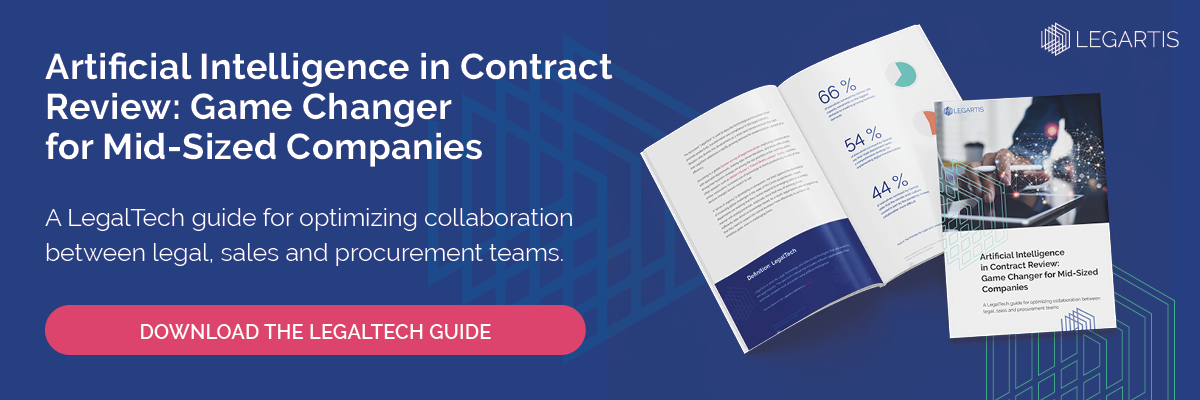These are challenging times for in-house legal professionals. Despite increasing complexity and capacity constraints, they are expected to review more and more contracts in the shortest possible time. A recent EY study predicts that the workload for legal counsels will increase by 25% over the next three years, while the number of employees is expected to increase by only 3% over the same period.
The growing challenges for legal counsel have long been calling for digital solutions; and the Coronavirus crisis, which has added an acute need for many legal teams to work almost exclusively digitally, has made it all the more clear that there is no way around the digitization of legal departments.
Intelligent solutions to help companies meet these challenges already exist on the LegalTech market. Automation in contract review, for example, ensures that workflows are optimized, thereby reducing capacity bottlenecks and simultaneously increasing the productivity of the legal department.
And that's not all: read here how AI-supported contract review can improve processes in other departments and thus increase the value of the entire business.
Contract Review Is the Optimal Use Case for Artificial Intelligence
The digitalization of legal departments has never been more urgent and the potential never more obvious: with LegalTech, legal counsel have the opportunity to simplify relevant processes, increase the value creation of the entire legal team, and better support the business, even in challenging times.
The good news: to do this, it’s not necessary to implement this vision of a fully integrated, digital and maximally efficient legal department overnight. Rather, companies should use the appropriate LegalTech solution to strategically and specifically target areas in which inefficiency is frequently the problem and there is great potential for increased efficiency. One such case is contract review.
Contract review offers especially high potential for increased efficiency
Many legal counsel believe that legal work is not a suitable match for the use of artificial intelligence. And they are not entirely wrong: not every task performed by a legal professional can be delegated to software. There are, however, tasks that legal counsel perform on a daily basis that are perfectly suited for the use of artificial intelligence due to their repetitive nature.
As a commodity task, contract review is one such example. It’s a task that accounts for a high volume of the legal counsel’s daily workload and involves applying previously established decision-making and operational processes to similar topics.
In other words: the legal review of contracts is a time-consuming task that takes a lot of capacity, but where the same corporate guidelines and standard contractual clauses are consistently used.
This means that the legal work in this context is the most plausible and straightforward to standardize. With automation in contract review, legal teams could unleash a particularly high potential for efficiency gains and thereby achieve decisive economies of scale in the legal department and beyond.
AI-supported contract review contributes to the solution of a core problem
In one study, a full 96% of respondents cited cooperation with other corporate divisions as the most important task of the legal department. However, when asked about the quality of this collaboration, the scores looked less promising: only 33% of respondents rated the collaboration as advanced, while 48% rated it mediocre.
Cooperation between the legal department and other departments is therefore a prevailing weakness with great potential for optimization. The negative impact of this finding should not be underestimated; if the purchasing and sales departments for example have to endure long waiting times for the legal department to review an urgent contract, this will slow them down when it comes time to close important deals with new suppliers or customers.
As a central component of the collaboration between different departments, the automation of contract review must start exactly where the need for optimization is highest. Starting this process with the legal department can trigger positive domino effects, which will help improve collaboration and allow processes to run faster and more smoothly throughout the company.
How a Business Benefits from Optimizing Workflows with LegalTech
LegalTech solutions based on artificial intelligence analyze contracts largely automatically and support employees step by step in the review process. In this way, not only will the workload of the legal department staff be reduced and collaboration between the various departments be facilitated – it will also benefit the entire business.
To illustrate the positive effects of LegalTech in contract review, we have compared two scenarios: workflow with and without AI support.
The starting point is the same in both scenarios: the demands on legal counsel are increasing, while the available resources stay the same or even become scarce.
Non-optimized workflows and the consequences for a business
- The workload for legal counsel continues to increase, growing by 25% over the next three years (as estimated by the previously-cited EY study).
- This inevitably leads to a bottleneck in the legal department: work orders pile up and the business cuts become visible. 50% of the participants in the EY study state that they have missed business opportunities as a result of this hold up.
- The pressure on employees increases, the high workload leads to a reduction in quality, and productivity decreases.
- The company's own internal guidelines and instructions may not be consistently enforced, the risk of errors and therefore the operational risks for the company increase equally
- Sluggish workflows spread throughout the company, starting with the legal department which cannot cope with the increased demands under tight resource constraints.
- Processes in other departments also slow down, the review of important supplier contracts or customer agreements is delayed, and the value creation of the entire business is undermined.
LegalTech-optimized workflows and the benefits for business
- LegalTech solutions with artificial intelligence and automation offer the possibility of making reliable legal know-how available throughout the company at the push of a button.
- Intelligent technologies for contract review relieve the legal department of repetitive tasks and the review of confidentiality agreements is shifted to other departments.
- This frees up time for legal counsel – time they urgently need to review more complex contracts – and increases productivity.
- Through the use of LegalTech, the company's own internal guidelines and instructions can be consistently enforced for every contract, there is more wide-spread standardization, sources of error are mitigated and operational risk is reduced.
- Positive effects on other departments: all contracts, both confidentiality agreements and more complex contracts, are processed faster. Sales and purchasing departments are empowered to consistently negotiate better contracts.
- More efficient processes throughout the entire company and deals with new suppliers or customers can be closed more quickly. Better conditions for maximum value added throughout the company.
- Use Legartis and benefit from optimized workflows throughout the entire company. The implementation is easy! After just 30 minutes of onboarding, Legartis’ artificial intelligence software is ready to go.
Discover the full potential of Legartis. Request a demo now.
Recommended Articles
KPIs in Contract Review
KPIs (Key Performance Indicators) are indicators that are used to measure performance and determine whether specified targets are being achieved. This applies to companies,..
Legal AI Talk: Latest Large Language Model Trends
AI and Large Language Models (LLMs) are revolutionizing the legal industry, streamlining contract analysis, document automation, and research with greater precision...
15 LLM Trends and Their Impact on Legal AI
The rapid development of Artificial Intelligence—especially Large Language Models (LLMs)—is fundamentally changing the way we interact with technology and process information...




